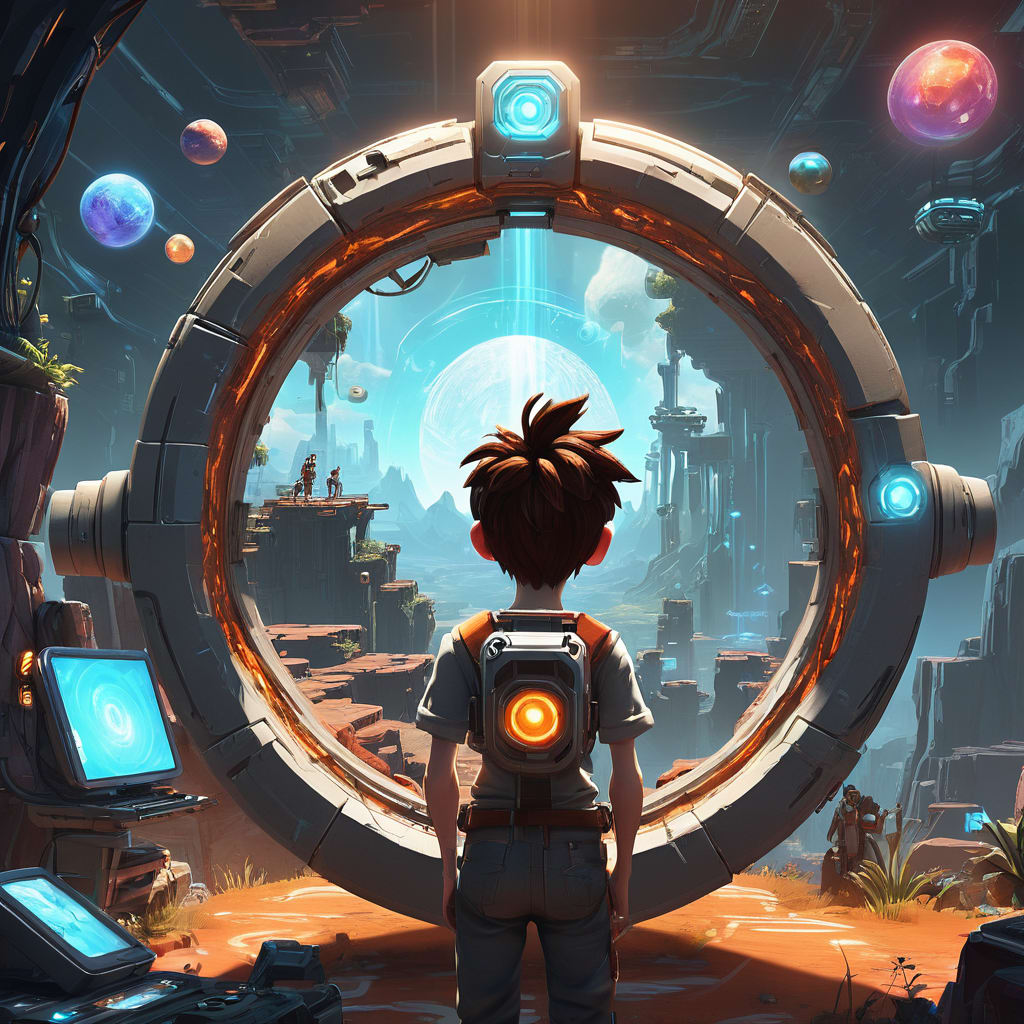Gaming: A Portal to New Worlds and Beyond
In the ever-evolving landscape of entertainment, gaming has emerged not just as a pastime but as a cultural phenomenon that transcends age, geography, and language. It's a multifaceted world where art, technology, storytelling, and social interaction converge to create experiences that are as diverse as they are engaging. From the pixelated adventures of the past to the immersive virtual realities of today, gaming has woven itself into the fabric of modern life, offering a portal to new worlds and beyond. This blog explores the journey of gaming, its impact on society, and the limitless possibilities it holds for the future.

The Evolution of Gaming
Gaming's journey from the simple yet addictive games of the 1970s to today's complex, narrative-driven experiences reflects the rapid advancement of technology and its integration into our daily lives. Early games like "Pong" and "Space Invaders" laid the foundation for a new form of entertainment, one that has grown in sophistication with titles such as "The Last of Us" and "Witcher 3," which offer cinematic storytelling, deep character development, and expansive worlds to explore. This evolution is not just about graphical improvements but about how games are designed to offer more immersive and emotionally engaging experiences.
The Impact of Gaming on Society
Gaming's impact on society is profound, influencing everything from popular culture to education and mental health. It has become a platform for socialization, with online games providing a space for people to connect, collaborate, and form communities. Educational games have transformed learning, making complex subjects accessible and engaging for students of all ages. Moreover, gaming has been recognized for its therapeutic potential, with games being used to enhance cognitive skills, provide emotional support, and even aid in physical rehabilitation.
Gaming as a Cultural Phenomenon
Gaming's rise as a cultural phenomenon is evident in its influence on movies, music, and literature, with many works drawing inspiration from video game narratives and aesthetics. Esports, competitive gaming, has elevated gamers to the status of professional athletes, with tournaments drawing massive audiences both online and in-person. Gaming conventions and expos, meanwhile, celebrate the creativity and community spirit of the gaming world, bringing together developers, players, and enthusiasts from around the globe.
The Future of Gaming
As we look to the future, the potential of gaming seems boundless. Emerging technologies like virtual reality (VR) and augmented reality (AR) are set to redefine the gaming experience, offering even more immersive and interactive ways to play. Cloud gaming promises to make high-quality gaming accessible to all, removing the need for expensive hardware. Furthermore, as artificial intelligence (AI) continues to evolve, we can expect games with more dynamic and responsive worlds, capable of adapting in real-time to player actions and decisions.
Conclusion
Gaming, once considered a niche hobby, has grown into a dominant force in entertainment, shaping how we play, learn, and connect with one another. It challenges our perceptions, pushes the boundaries of technology and creativity, and offers a window into the potential of human imagination. As we stand on the brink of new advancements in gaming technology, one thing is clear: the world of gaming is a testament to the endless possibilities that await when we dare to dream and explore. Whether as players, creators, or spectators, we all have a role in this ongoing journey, a journey that promises to take us to new worlds and beyond.
The Transformative Power of Gaming: A Portal to New Dimensions
In the digital age, gaming has ascended beyond mere entertainment, morphing into a multifaceted cultural phenomenon that shapes narratives, forges communities, and revolutionizes learning. This dynamic world, where technology, art, and storytelling interlace, offers more than escapism; it provides a mirror to society, reflecting and sometimes shaping our values, struggles, and aspirations. As we delve into the transformative power of gaming, we uncover its role as a conduit for storytelling, a catalyst for social connection, and a revolutionary educational tool.
Gaming as a Storytelling Medium
The narrative depth of modern video games can rival that of literature and cinema, offering immersive experiences that are both interactive and emotionally compelling. Titles like "Life is Strange" and "Firewatch" exemplify how games can tackle complex themes such as identity, grief, and moral ambiguity, engaging players in ways that are personal and impactful. Through the interactive nature of gaming, players become active participants in the story, leading to a deeper connection with the narrative and characters. This unique aspect of gaming opens new vistas for storytelling, where the lines between creator and audience blur, allowing for a more personalized and profound experience.
Forging Social Connections Through Gaming
Gaming's ability to connect individuals across the globe is one of its most celebrated feats. Online multiplayer games like "Fortnite" and "World of Warcraft" have become virtual social hubs where players collaborate, compete, and socialize, transcending geographical and cultural barriers. These platforms foster a sense of community and belonging, offering a space for social interaction that is especially valuable in times of physical distancing. Furthermore, gaming communities often rally around charitable causes and social issues, demonstrating the potential of gaming to not only bring people together but to mobilize them towards common goals.
Revolutionizing Education with Gaming
The educational potential of gaming is immense, leveraging engagement and interactivity to enhance learning. Educational games such as "Kerbal Space Program" teach physics and engineering through the fun and challenge of space exploration, while "Assassin’s Creed Discovery Tour" offers a virtual journey through history. These games exemplify how gamification can make learning more engaging and effective, appealing to a generation of digital natives for whom interactive media is second nature. By blending entertainment with education, gaming has the potential to transform traditional educational paradigms, making learning a more engaging, relevant, and enjoyable experience.






Comments
There are no comments for this story
Be the first to respond and start the conversation.